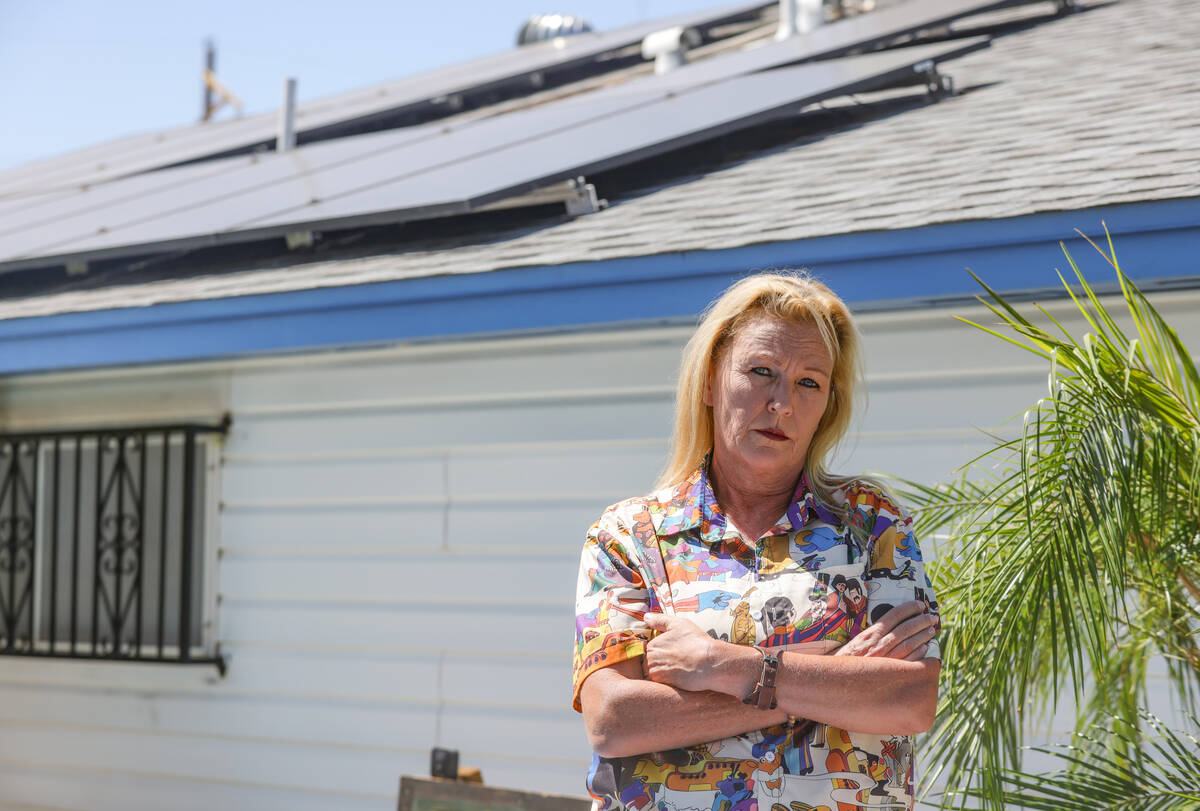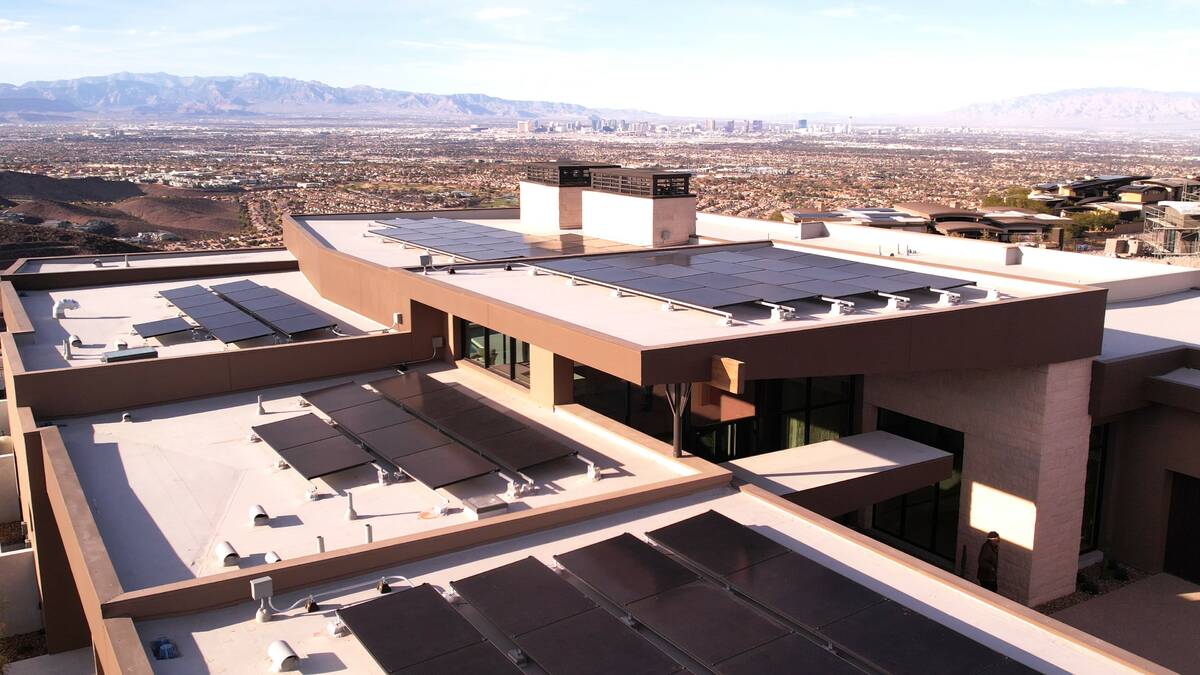Solar panel scams are on the rise in Nevada. Here’s how to protect yourself
Charlyne Cutler considers herself lucky when it comes to all the solar panel scams hitting Nevada residents lately.
She has somewhat functioning solar panels on her roof, however is out $63,000, years of frustration and headaches, plus her energy bill hasn’t really gone down that much.
“Some people that I’ve met through this whole thing and the Facebook group have had it way worse,” she said. “I think solar panel technology is amazing, but some of the people working in the industry are downright scoundrels.”
Cutler, of Las Vegas, first started researching solar panels in 2021 and settled on working with Titan Solar Company, which has since had its license revoked and fined $400,000 by the Nevada State Contractors Board in July. She said the process started off well with the now defunct Arizona-based company, but after a few months, it was nothing but issue after issue. Cutler said she’s hoping she can bring awareness to a growing problem within the valley, shady businessmen preying on people wanting to save money on their electric bills.
“The installers did everything wrong,” she said. “They didn’t pass inspection, they forgot SIM cards, they forgot to attach things, they forgot to turn things on or off — some of the most simple things like that, it was just laughable. And I was like, ‘This is my house you’re working on.’”
Scam complaints spike
Solar panel scams are on the rise in the state, according to the NSCB, as there were 38 complaints made in 2021. That number then jumped to 106 in 2022, 273 in 2023 and sits at 211 so far in 2024 — a roughly 455 percent increase from 2021. Most of the victims that scammers target are adults 60 years or older.
In one of the latest cases, a district judge in August sentenced former solar contractor Derek Carbajal for fraud and deceit in the course of an enterprise or occupation, which is a felony. Carbajal was sentenced to 12-90 months in prison along with a combined fine and restitution of nearly $400,000. His company, Lifetime Power LLC, had its licensed revoked by the Nevada State Contractors Board in September.
Nevada State Contractors Board investigators found that between 2022 and April of last year, Carbajal defrauded eight “vulnerable homeowners” of nearly $250,000. During the scam, Carbajal would demand half of the payment upfront as a down payment, and then would take the victim’s money and never do any work.
NV Energy spokesperson Meghin Delaney said they are hearing about solar panel scams “far too often” right now.
“We’ve heard complaints from NV Energy customers who have been scammed or misled by third parties who make money installing private rooftop solar,” she said. “We appreciate the work of other organizations in Nevada who are working to hold these companies accountable. We encourage NV Energy customers to use the resources we provide on our website to make sure they are dealing with properly licensed companies. Customers can always reach out to NV Energy directly to see what resources we can provide them.”
NV Energy’s website has a page with solar panel information and outlines the financial realities surrounding the green technology.
“An upfront investment in the tens of thousands of dollars is likely,” reads NV Energy’s website. “While there is no cost for the sun, collecting its energy for electricity is not free. It typically can take a system anywhere from five to 10 years to pay for itself. However, if you think about it in terms of a return on your investment, you may see returns of seven to 10 percent.”
A bill passed in the Nevada Legislature last year, which went into effect in January, is designed to protect consumers from solar panel scams. It was built around the notion that many scammers use door-to-door sales tactics where they make false claims and promises about the technology in order to secure upfront payments to install the panels. The law requires every Nevada solar installation company to hold a contractor’s license or be employed by a licensed contractor. Companies also must be more transparent in the total cost of the panels, monthly payments and estimated value of energy credits and rebates.
How to spot a solar panel scam
NSCB Executive Officer David Behar said the first sign to look out for when it comes to any contractor proposing to do work on someone’s house is asking for a large payment before any work is done.
“Nevada law stipulates that the down payment for any residential project must be either 10 percent of the total contract or $1,000, whichever is less,” he said. “To safeguard your investment, avoid paying a contractor more than this amount upfront.”
Behar added some other things to make sure you do when hiring any type of contractor: get at least three bids on the project, never pay with cash, never make a check payable to an individual — only a company — and never feel pressured to sign a contract. He also said to check to make sure the contractor has a license with the NSCB and if there are any complaints against them.
The NSCB has also launched a specialized Solar Investigations Unit due to the growing number of complaints.
“Of the 3,000 complaints the Board receives annually, nearly one-third are homeowner complaints about solar companies,” said former NSCB executive officer Margi Grein. “Complaints include misleading sales tactics with promised benefits such as rebates, government incentives, and the complete eradication of electric bills.”
Contact Patrick Blennerhassett at pblennerhassett@reviewjournal.com.


















